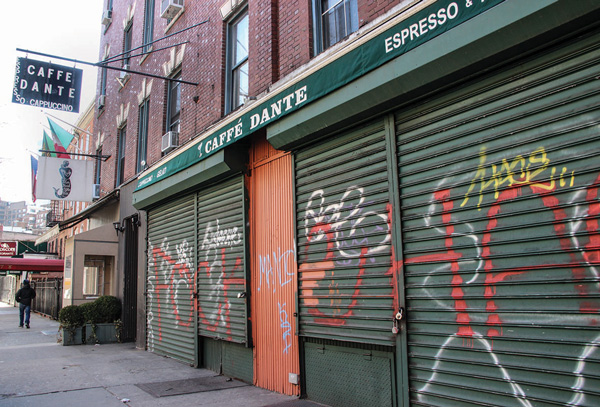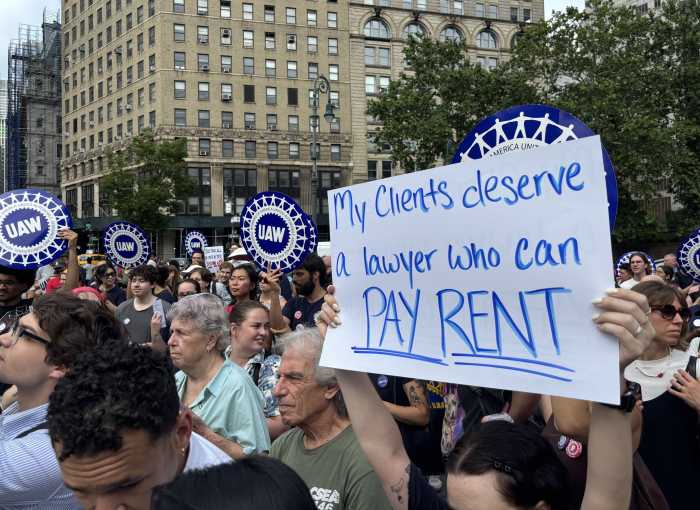
BY LINCOLN ANDERSON | Following The Villager’s announcement last month that the newspaper would be co-sponsoring a groundbreaking forum on the Small Business Jobs Survival Act, there has been a surge of public support to pass the long-stalled bill.
The overall effort is being spearheaded by the Small Business Congress NYC (savenycjobs.org).
Basically, the act offers a way to staunch the city’s hemorrhaging of mom-and-pop shops in the face of skyrocketing rents and amid the influx of chain stores, which are among the few businesses that can afford the astronomical rents.
However, last week, a leading voice for the city’s real estate industry lashed back, saying that the measure, if passed, would amount to an “unconstitutional taking,” by limiting landlords from maximizing profits on their property.
The bill, in one form or another, has been blocked for coming up for a vote in the City Council since the 1980s. It calls for allowing commercial tenants in good standing to be able to renegotiate “fair” 10-year leases: If a tenant and landlord cannot come to terms, there would be nonbinding mediation, followed, if necessary, by binding arbitration.
As recently as five years ago, the S.B.J.S.A. had 32 sponsors in the 51-member City Council, but was — once again — blocked by coming up for a vote, this time by then-Council Speaker Christine Quinn. A bill can pass with a 26-vote simple majority, while 34 votes is veto-proof against mayoral opposition.
Advocates charge that big real estate has always worked quietly behind the scenes to ensure that the game-changing proposal never sees the light of day.
Following The Villager’s publicizing its March 5 forum at Judson Church and the subsequent increased media coverage of the S.B.J.S.A., the number of the legislation’s current sponsors has crept up a bit, from 14 to 16.
But Steven Spinola, president of the Real Estate Board of New York, blasted the bill, saying that it’s not even clear if it can be legally implemented.
“Yes, I’m very familiar with it,” Spinola, head of REBNY since 1986, said of the S.B.J.S.A. “We’ve gone through different administrations with it. We are absolutely convinced that the City Council, the mayor do not have the power to impose control on the leasing of properties. We have had discussions with the Corporation Counsel [the city’s Law Department]. At the very least, it would have to go to the state — and we’re not sure that the state would have the power to impose this.”
Even if the bill were somehow to pass, he assured that big real estate would not take it sitting down.
“This is a constitutional taking, and it will be legally challenged,” he stated.

REBNY has 16,000 members, including property owners, brokers and other real estate professionals.
“We continue to have a good dialogue with the mayor,” Spinola said. “We have not had this conversation with the new administration or the leadership of the new City Council yet, but have conveyed that we don’t think it’s legal.”
The only way the bill could be approved, he said, is possibly if Albany were to declare a “state of emergency” regarding small businesses, similar to what was done with rent regulation, which is premised on there being a “housing emergency” — namely, when residential vacancies are below 5 percent.
However, advocates note that five years ago, a legal panel in New York City found that the bill is constitutional.
In general, as REBNY members see it, the S.B.J.S.A. would put way too much power in the hands of retail tenants.
“It says the tenant, at the last minute, has the right to match the lease an owner is about to do,” Spinola said. “Why would a tenant negotiate with me, if they know that they can be pushed aside because ‘Tenant A’ that is in there has the right of first refusal? The tenant that’s still there, that doesn’t have to pay for moving in, can undercut you by $1 and get the space.”
If anything, Spinola said, he is in favor of giving “tax incentives” to landlords who work to keep commercial tenants in place. The City Council is currently lobbying the state Legislature to pass a bill along these lines. But small-business advocates assert that lease renewals are the number one factor that makes or breaks small businesses.
At the same time, Spinola conceded, “Do some tenants have difficulty meeting their rents? Some do.”
However, he said, “Areas change. That happens across the country, and across the world.”
In short, he contended, the current retail landscape is shaped less by chains forcing out smaller businesses because they can afford to pay higher rents, than by consumers driving the market.
“The main reason Duane Reades and Walgreens are there is because people purchase there. There is no Woolworth’s anymore,” he noted, referring to the “five-and-dimes” of a bygone era. “They’re Duane Reades, they’re Walgreens. We went from a drug store to a full-service store. This is a free market. It’s not something that should be negotiated.
“Duane Reade is not going to operate in a spot where they’re losing money,” he contended. “They compete to get that customer into the store. I don’t accept that this is unfair competition.”
Also, while a mom-and-pop shop might close at midnight, for example, some Duane Reades are open 24 hours, and some people like the convenience of being able to buy a quart of apple juice there at all hours, he noted.
As for small stores being forced out by high rents, he said dismissively, “The reason they can’t pay more money is because they weren’t selling enough. Period.”
And stores that fill a particular niche come and go with the changing times, the REBNY president added. For instance, there used to be lots of TV-repair shops, but now people just throw out broken televisions, he said.
Plus, it’s also simply tough to be a merchant: Fifty percent of new businesses close within two years, he noted.
But what about the fact that the city actually had commercial rent control from 1945 to 1963? Spinola was asked.
“I’m not aware of 1945 to 1963,” he shrugged. “I don’t know what they’re talking about. I could see there would be something during the war, which is when we got residential rent regulation.”
In fact, it was progressive Mayor Fiorello LaGuardia who, during World War II, put into place the nation’s first commercial rent-regulation law here.
The Villager asked Spinola if, assuming the S.B.J.S.A. were passed, wouldn’t property owners still be making good money, just maybe not squeezing out every last penny of profit?
“Should we have a law that says you shouldn’t make more than a certain amount?” he retorted. “I understand minimum wage. But when you take away the profit that you can make, you are taking the property.”
The act would apply to commercial office space, too, he noted.
Similarly, Spinola didn’t have anything positive to say about so-called “formula zoning,” under which municipalities can block certain types of businesses — like national chain stores — from opening in certain retail zones. This has been done in some other cities, such as parts of San Francisco.
“I don’t understand it,” Spinola said of the concept. “That’s basically government deciding where people can shop, and I think that’s wrong. People drive out of the city to Walmarts and Targets. If big-box stores don’t work — then why are they working?”
New York City albeit does have some big-box stores, “but not enough,” he declared.
On the other hand, the city’s special zoning that keeps nightclubs and music venues away from residential areas, in his view, is appropriate.
Advocates believe the S.B.J.S.A. would help preserve neighborhoods’ character — a special quality, they note, that draws people from all around the world to visit places like the historic, legendary Village.
But Spinola scoffed that New York shouldn’t be preserved like a giant museum.
“The character of New York is that it’s thriving, it is growing and it is changing,” he said. “Who wants to come to New York if you say, ‘It’s going to stay the same forever?’ We’ve got museums that are exciting to see. But when they walk the streets, people want to see what New York is today.”
While it obviously would not be easy — perhaps impossible — to get REBNY to change its tune on the S.B.J.S.A., local city councilmembers have lined up behind the measure.
Corey Johnson, who represents the Village and Chelsea, said in a statement, “I am proud to be a co-sponsor of the Small Business Jobs Survival Act. Our small businesses and the people who love them are what make New York special. They shouldn’t need corporate backing to stay afloat. If only chain stores can afford to stay here — something needs to change. I am working with Councilmember Annabel Palma to encourage my colleagues to sign on and sponsor this critical piece of legislation.”
Like Johnson, Margaret Chin, who represents Lower Manhattan’s First District, is also a supporter of the bill in the City Council. In a statement to Sharon Woolums several months ago for one of Woolums’s columns on the S.B.J.S.A. in The Villager, Chin said, “I am deeply concerned about the difficulties faced by the valuable small businesses that make our community great. Since ever-rising rents contribute to the closure of so many small businesses, I continue to co-sponsor the Small Business Jobs Survival Act, which would create fair rent negotiations and help save many of these beloved stores.”
However, Rosie Mendez, who represents the East Village’s Second Council District, currently is not listed among the sponsors of the S.B.J.S.A. Her office did not respond to requests for comment about her thoughts on the bill.
A list of the S.B.J.S.A.’s sponsors, more about the bill, a petition to show support and information on how to get involved in the cause can be found at savenycjobs.org .
Palma, who represents the Bronx’s 18th District, and is the bill’s lead sponsor, said she is working to build support for it.
The bill’s two newest sponsors are Helen Rosenthal and Laurie Cumbo, who both came on board within the past two weeks.
“I am still speaking to my colleagues and trying to get as many to sign on,” Palma told The Villager last week. “We know how important it is for this bill to have a hearing. We want to have a hearing and have both sides speak out.
“In our last session [in the City Council under Quinn], we did have a majority of our members sign on and want to pass this bill. I think the sentiment is still there.”
Asked if she thinks the new Council speaker, Melissa Mark-Viverito, will let the bill come up for a vote, Palma said she’s hopeful.
“We’ve seen that there have been a lot of changes in this new Council,” she said. “I’m confident this Council will operate in the way the majority feels.”
Ultimately, the S.B.J.S.A. could be a win-win for all involved, according to Palma.
“This bill definitely has the best interests of the business community and the real estate industry,” she maintained. “Once you make sure all stakeholders understand that it benefits both sides, bring them to the table.”
The Villager has helped jump-start the recent burst of energy for getting the S.B.J.S.A. passed. Interest began to build when this newspaper’s Feb. 19 issue ran an ad publicizing the highly anticipated March 5 forum on the bill at Judson Church that was co-sponsored by The Villager and Village Independent Democrats.
The following week, in its Feb. 26 issue, The Villager ran an editorial about the upcoming forum and the bill, further highlighting the issue. That same week, Jeremiah’s Vanishing New York blog ramped up its three-month-old online campaign, www.savenyc.nyc, with an even stronger emphasis on supporting the S.B.J.S.A. Among the supporters of the blog’s Facebook page is Mark-Viverito.
However, there was no response from the Council speaker to The Villager’s requests for comment on whether she intends to let the S.B.J.S.A. come up for a vote any time soon.
Steve Null, a former member of the Small Business Advisory Board in the Dinkins and Giuliani administrations, wrote the original S.B.J.S.A. 30 years ago for former Councilmember Ruth Messinger. He said the fate of the bill today will show how progressive Mayor Bill de Blasio and Mark-Viverito truly are.
“We know from history that what is happening to our small businesses today would never have happened under Mayor LaGuardia or the Roosevelts when they were governor, all New Yorkers, all true progressives, all believers in government creating progressive legislation to solve a public problem,” Null said.

Sometimes an outpouring of public support can help a threatened business stave off eviction and keep an affordable rent. This has happened at least twice with Ray’s Candy Store on Avenue A in the past 15 years.
“Five years ago, I had no money to pay rent,” the store’s longtime operator, Ray Alvarez, a.k.a. Asghar Ghahraman, 82, said last week while, as usual, manning the overnight shift.
Back then, a local lawyer working pro bono helped him get a yearlong lease after nine years of being on a month-to-month one.
“The reason they renewed my lease,” Ray said, “they didn’t want public anger.”
When he took over the hole-in-the-wall store in 1974, Ray paid just $120 a month. Now it’s up to $4,500. In July, his landlord will raise it — but just a bit — to $4,800.
A regular customer who was keeping Ray company recalled the community outpouring in the ’80s to save Orchidia restaurant, at E. Ninth St. and Second Ave., after the place’s rent was raised from $950 to an unaffordable $5,000 a month.
“That was the first one,” he said. “They got all the politicians involved. They lost.”
The man requested anonymity. Ray quipped to identify him as “Ray’s son.”
Told about the S.B.J.S.A., “Ray’s son” said it sounded to him like “pie in the sky.”
But — who knows? — maybe with de Blasio and Mark-Viverito, the bill just may at last have a chance.




































